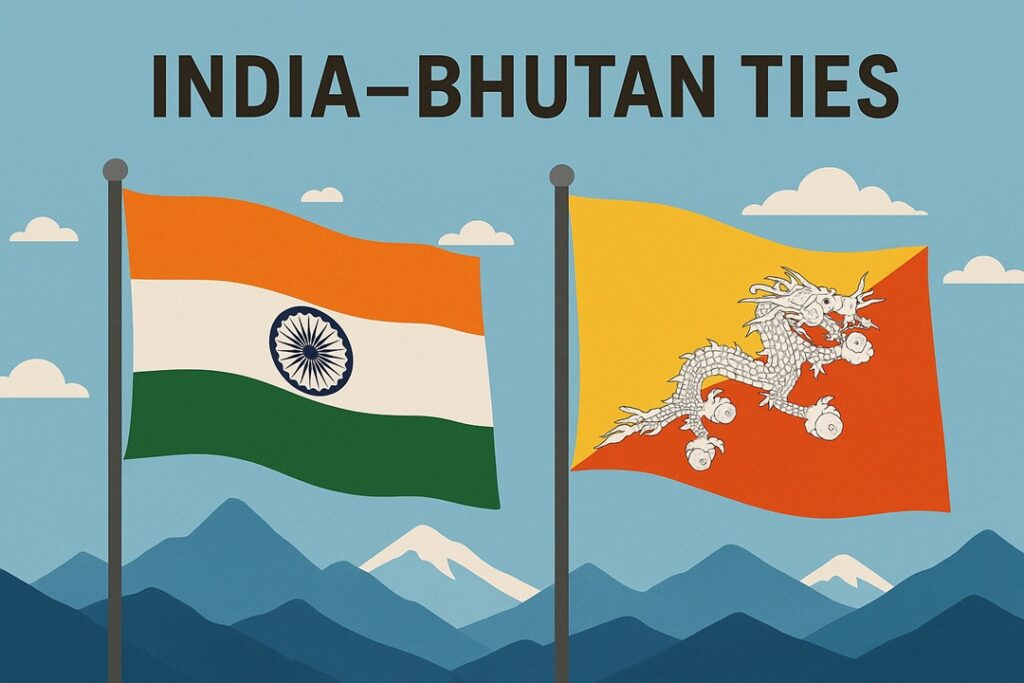India–Bhutan Ties: A Model of Mutual Trust and Regional Stability

context
Prime Minister Modi completed a two-day state visit to Bhutan last week. The visit coincided with the 70th birth anniversary celebrations of Bhutan’s Fourth King and the Global Peace Prayer Festival.
Pillars of India–Bhutan Relations
Unique Bilateral Partnership
India and Bhutan share a close, time-tested relationship rooted in mutual trust, goodwill, and strategic understanding.
Diplomatic Relations
Formal diplomatic ties were established in 1968.
The 1949 Treaty of Friendship and Cooperation, revised in 2007, forms the foundation of relations.
High-level visits continue regularly, including multiple visits by Bhutan’s King between 2022 and 2024 and PM Modi’s visits in 2019 and 2025.
Bhutan remains central to India’s Neighbourhood First Policy.
Trade and Economic Relations
India is Bhutan’s largest investor, contributing about 50 percent of total FDI.
Bilateral trade has tripled in the last decade, reaching USD 1.6 billion in 2022–23.
Key imports from Bhutan include hydropower, ferrosilicon, cement, and agricultural goods.
Indian exports include fuel, machinery, food items, and construction materials.
Development Partnership
India supported Bhutan’s 12th Five Year Plan with Rs 4,500 crore, forming 73 percent of Bhutan’s external grants.
India has committed Rs 10,000 crore for Bhutan’s 13th Five Year Plan.
Focus areas include rural water supply, education, digital connectivity, agriculture, infrastructure, and health.
Hydropower Cooperation
Four major hydropower projects are operational: Chukha, Kurichhu, Mangdechhu, and Tala.
India imported hydropower worth Rs 2,448 crore from Bhutan in 2022.
Education and Capacity Building
India offers over 1,000 scholarships annually, with around 4,000 Bhutanese students studying in India.
Under the ITEC programme, about 300 training slots are provided annually.
Digital Cooperation
Bhutan became the second country to adopt the BHIM app, strengthening UPI-based cross-border payments.
India supports Bhutan’s Digital Drukyul programme through nationwide optical fibre connectivity.
Space Cooperation
An MoU on peaceful uses of outer space was signed in 2020.
The India-Bhutan SAT, jointly developed by ISRO and Bhutan’s DITT, was launched in November 2022.
Cultural and People-to-People Ties
The India–Bhutan Foundation (2003) promotes cultural, educational, and environmental exchanges.
India supports Buddhist heritage conservation and monastic exchanges.
Nearly fifty thousand Indians work in Bhutan across construction, education, and technical roles.
Health and COVID-19 Cooperation
India supplied 5.5 lakh Covishield doses under Vaccine Maitri.
India also facilitated the return of over two thousand Bhutanese citizens during the pandemic.
Defence and Security Cooperation
India trains the Royal Bhutan Army, supports joint border management, and provides equipment and logistics.
India assisted Bhutan during Operation All Clear (2003) to remove insurgent camps.
Both countries coordinate closely on regional security matters, including during the Doklam standoff in 2017.
Bhutan’s geographic position as a buffer between India and China enhances the strategic value of the partnership.
Key Highlights of PM Modi’s State Visit to Bhutan
Economic and Developmental Support
India reaffirmed its assistance for Bhutan’s 13th FYP and signed MoUs in renewable energy, health, and mental health.
Cultural Cooperation
India allotted land in Varanasi for constructing a new Bhutanese Buddhist temple.
Hydropower Progress
The 1020 MW Punatsangchhu-II project was inaugurated, and work resumed on the 1200 MW Punatsangchhu-I project.
Line of Credit for Energy
India extended a Line of Credit worth Rs 40 billion for new energy projects.
Connectivity and Infrastructure
New check posts and border facilitation points were announced at Gelephu and Hatisar.
Bhutan will gain access to the Jogighopa multimodal logistics park.
India will fund two new railway links: Samtse–Banarhat and Gelephu–Kokrajhar.
What Lies Ahead
India–Bhutan ties are expanding into a comprehensive strategic partnership.
Future cooperation will grow in sectors such as digital infrastructure, space technology, education, hydropower, and private sector investment.
Shared values and sustained political engagement will continue to strengthen this relationship.
Source : The Hindu
